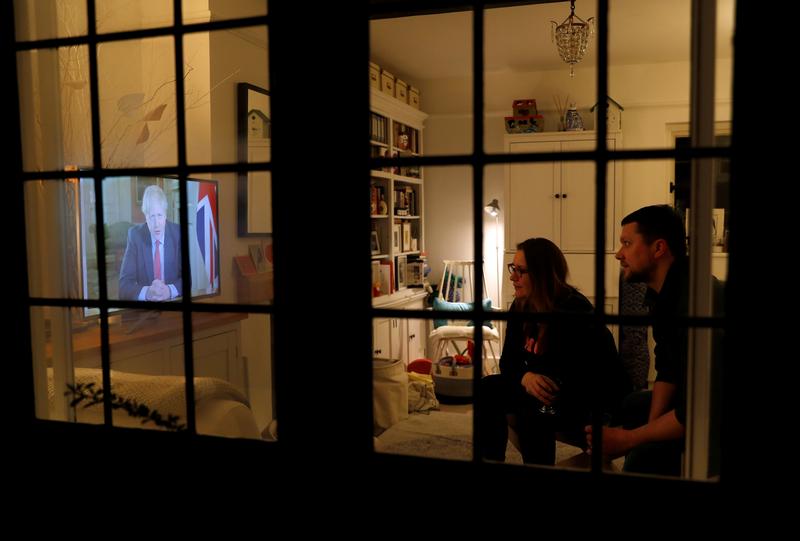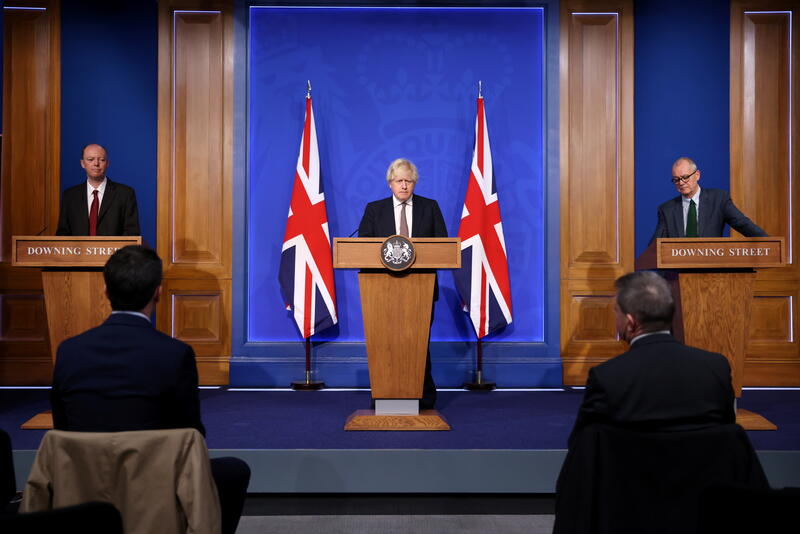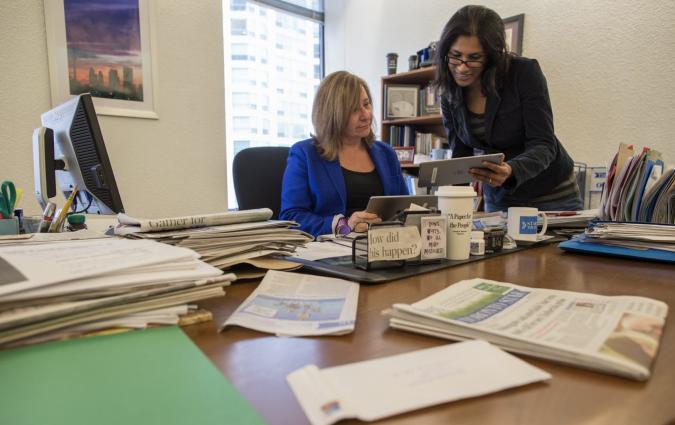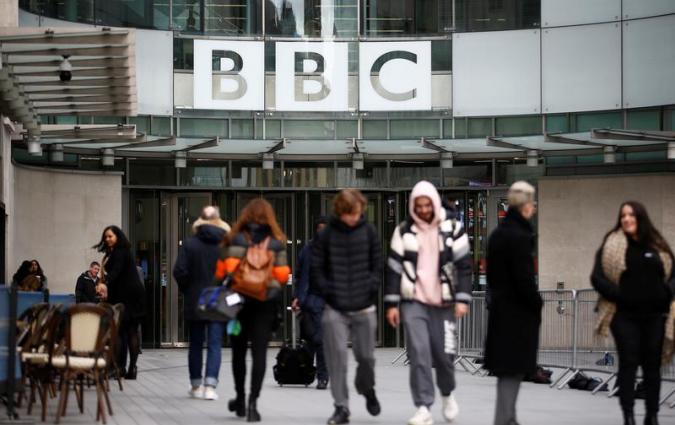In this piece
The challenges of making news for a multinational state – a view from the UK

An isolated couple watch British Prime Minister Boris Johnson's press conference as the spread of coronavirus disease (COVID-19) continues in Britain, March 23, 2020. REUTERS/Peter Nicholls
It was memorably described to me by Mark Thompson, former BBC Director-General, as the ‘Oh Shit’ moment: when Whitehall, the seat of UK political power, collectively realised in the late 1990s that devolution was going to be more difficult than they’d thought.
The UK state has undergone a transformation since the process of devolution began with the setting up of parliaments and assemblies in Scotland, Wales and Northern Ireland. Distinct and new political cultures have emerged.
For the news teams of the UK’s Public Service Broadcasters – the BBC, Channel 4, and ITV – this has been a challenge, too: how to serve the different audiences and information requirements of four constituent parts alongside that of the UK as a whole. Even with the best will in the world, it’s not an easy task.
Alun Davies, a Labour Member of the Welsh Parliament and former Deputy Culture Minister, told me: “UK PSBs didn’t have the first idea what devolution was and the way it would change the United Kingdom. I think they saw [the parliaments] as super councils, and that the ‘and finally’ spot would be sufficient so that you would have ‘the Scotland spot’ or ‘the Welsh spot’, every couple of weeks, or every couple of months, to suggest that something else was happening in those places.”
The enduring legacy of this failure, Davies said, is that in Wales there is still “a significant portion of the population who don’t know how they’re governed”.
These informational challenges weren’t confined to Wales. Constitutional lawyer and former Conservative Member of the Scottish Parliament, Professor Adam Tomkins, found a gap between journalism and a nascent national political culture in Scotland but for somewhat different reasons. Tomkins found that “most” London-based political journalists hadn't thought “at all” about devolution or Scotland, in the period between the creation of Scottish Parliament in 1999 and the run-up to the Scottish independence referendum, starting in 2011.
The COVID-19 test
COVID-19 brought that challenge into stark relief: the biggest story covered since World War II, and the first major national emergency since the process of devolution began. The early stage of the pandemic saw extraordinarily high numbers for news provided by PSBs.
Their role was fundamental to the UK’s information infrastructure and, according to Ofcom, “reinforced the importance of public service broadcasters as trusted providers of news and information”. During 2020, BBC services were the most used source of news and information about COVID-19, with eight in 10 people (82%) saying they used them for this purpose in the first week of lockdown – well ahead of other broadcasters, social media and other sources. The BBC, ITV and Channel 4 were also each rated by Ofcom research as “trusted sources of news and information” by more than eight in 10 people at the start of lockdown.
May 2020 brought about the major turning point in the “four nations” approach, when the UK Government’s move to change its core “stay at home” messaging. Until then, the injunction had been accepted by all four nations, but a proposed relaxation of “stay at home” rules could legally only be applied to England, and the devolved governments were disinclined to adopt such a change at the same time

Britain's Prime Minister Boris Johnson, Chief Medical Officer Chris Whitty and Chief Scientific Adviser Patrick Vallance attend a press conference on the new Omicron coronavirus variant, in London, Britain November 27, 2021. Hollie Adams/Pool via REUTERS
Looking back at this early period, Andy Davies of Channel 4 News attributes the difficulties of the situation to a “Prime Minister [...] not making it clear, in some of his Downing Street press conferences, that a large amount of what he was saying [was] exclusive to England”. It created a real problem around accuracy in the middle of a public health emergency, according to Davies. The issue was felt particularly in Wales, he said, given most people there get their media from UK-wide sources. During this period, with “two governments who are clearly at odds”, Davies viewed the role he and other journalists were performing as invaluable: “We had a real duty to ensure that whatever we were saying was the absolutely accurate version.”
In Scotland, there was a real lack of clarity around who was responsible for key issues, such as COVID-19 testing and providing vaccines, according to Channel 4 News’ Ciaran Jenkins. He concludes that “It wasn't in the Scottish Government's interest to say, ‘Actually, the UK Government provided all this stuff’.”
Irrespective of blame or motivation, announcements that lacked specificity would have important consequences during the pandemic. A Northern Ireland Executive official who spoke to me for this paper said that wrongly attributing England-only policy changes around COVID-19 to the whole of the UK created “harm” and “confusion”.
On 22 May 2020, Ofcom wrote to broadcasters reminding them of the need to “take particular care when broadcasting […] statements about public health advice on the Coronavirus which may not apply to all four nations in the UK, given the variations in official guidance between the nations”. The regulator’s advice was well-timed, since it seemed to chime with what some audiences were feeling during this period.
A news diary study conducted during this early phase of the pandemic suggested that UK network news audiences were “confused by the health guidance they were receiving and did not understand which government was accountable for the measures”. The study by Cardiff University’s School of Journalism, Media and Culture also uncovered a desire amongst audiences for “more clarity in news reporting about the relevance of different lockdown measures across the UK”.
As the pandemic continued and summer turned to the autumn of 2020, officials I interviewed said that inter-governmental communications improved somewhat. According to one Welsh Government official who spoke to me off-record, the then Minister for the Cabinet Office Michael Gove ensured better communication between the Cabinet Office and the devolved governments. “[Michael Gove] had more time than [Boris Johnson] to dedicate to it, but he made a genuine effort […] to try and find common ground”, he told me. This new cooperation bore fruit, with attempts to coordinate messaging and public information films.
COVID-19 resulted in the UK PSB’s nations’-based correspondents receiving more exposure than ever before, but prominence brought a number of challenges. One of the major editorial issues was around the structuring of stories and the need to tell the devolved nations’ stories in their own right, and not wholly on the basis of divergence from England. ITV News’ Scotland Correspondent, Peter Smith, explained how he would “push back” at such a commission on the basis that he “didn't think that was the right way for us to be doing news because it gives too much credence to England over the devolved nations and put the devolved nations in as that sort of afterthought”. Other journalists, however, recognised the contextual value of the comparative frame on occasions. The BBC’s Emma Vardy, for example, explained that the “reference point” of comparisons with the rest of the UK was useful in telling Northern Ireland’s story to a wider audience.
Another issue was the amount of work involved in telling a whole nation’s story in a time of crisis. ITV’s Peter Smith tells of his personal “struggle” in having to contend with the sheer volume of work involved. He also describes the challenge of having to balance the need to provide updates on a dynamic story with the need to provide a holistic narrative for a UK-wide audience.
It is too early – if not futile – to predict with confidence what legacy, if any, will be left by COVID-19 for journalism and communications in the UK. But some practitioners are willing to suggest that there will be some enduring consequences. One of these, according to the BBC’s Sarah Smith, is that the pandemic was an awakening for “parts” of the London-based media regarding what devolution entails and “a very good lesson for them in how things are different”.
Core issues, key questions
My paper draws on the testimony of some of the key UK PSB Network reporters, producers and leaders working in the devolved nations, to explore not only COVID-19 coverage but a number of other pressing issues related to news coverage in a multinational state.
I chose this topic to focus on during my fellowship at the Reuters Institute because my work at the BBC, first as a journalist and now in policy, straddles these questions. It also involves looking both ways: towards my home nation, Wales, and towards the rest of the UK.
Among the issues raised were the receptiveness of UK network centres to receiving and broadcasting stories generated by nations’ correspondents, the London-centric nature of UK journalism and resulting gaps in local knowledge, decentralising the permanent location of news-gathering resources and staff, and issues around editorial policy and oversight.
The BBC’s Emma Vardy is now one of just two full-time UK Network news correspondents based in Northern Ireland. Both are employed by the BBC. Vardy describes a paradoxical situation with a highly politically motivated society in Northern Ireland, but is also acutely aware that some “people actually in England” wouldn’t, potentially, “really care” if Northern Ireland became part of the Republic of Ireland. Voters in, for example, Birmingham, wouldn’t necessarily care, she claimed, about “Sinn Féin and DUP battles.”
This pragmatic appreciation of newsworthiness compels her to pitch appropriately. For the bigger stories, such as Brexit or the legacy of the Troubles, the barriers to being carried on the network are lower than for other, more general stories. Vardy, however, emphasised the importance of this other category of story – universal stories that are not necessarily unique to Northern Ireland – as a means of ensuring that the region would not be continuously equated with the travails of Brexit or paramilitary activity. An example of this was the high level of cancer operations being delayed in Northern Ireland due to COVID-19 – a specific story but with universal resonance.
Perhaps the most troubling issue raised was the abuse directed at journalists covering devolved nations. Sarah Smith was the BBC’s first Scotland Editor, in post from 2016 until late 2021. Whilst careful not to identify a specific section of the political community, she recounts a difficult experience, having been “demonised quite heavily […] amongst certain parts of the population”.
People, she said, would “...roll their car windows down as they drive past me in the street to ask me, ‘What fucking lies you're going to be telling on TV tonight, you fucking lying bitch’.” This “vitriolic attention”, Smith told me, happened “most of the time” if set up to do a live television contribution. Smith also told me she had “pretty much stopped tweeting” for fear of attracting the “shit I can live without”.
Smith also felt that her personal position – as daughter of former UK Labour Leader John Smith – made her uniquely vulnerable to criticism. “He was a very well-known politician, he was a Unionist, people like to therefore assume that my politics must be the same as my father's despite me being, one, a different person, and him having been dead for 27 years.” The abuse was not confined to Sarah Smith’s antecedents. She also suspects that her gender was an aggravating feature behind her experiences.
Even more serious is the final, personal impact reporting in Scotland has had on Sarah Smith herself. In November 2021, she was appointed the BBC’s North America Editor. She describes her sentiment at leaving Scotland as being one of “relief”. Despite the prospect of reporting on the polarised politics of the United States, she notes with satisfaction that she “won’t be famous at all” in the US and will be “gloriously anonymous”. Whilst viewing complaints about reporting as an inevitable consequence of her vocation, Scotland being her home made things different for her. By contrast, in the United States, “Nobody will have any idea who my father is. So, the misogynistic idea that I can't have any of my own thoughts anyway, or rise above my family connections to report impartially will no longer be part of the discourse.”
Looking ahead, Smith predicts “enormous scrutiny” of the BBC were there to be a second referendum on Scottish independence. She depicts a potential situation where the BBC would be “actual players” in any such referendum with news reports “politicised and weaponised by both sides”. In such a situation, she warned, the BBC would attract “such an enormous amount of incoming criticism that it would be almost a full-time job to manage that, never mind trying to cover events”.
Sarah Smith’s ITV counterpart in Scotland, Peter Smith, also speaks of having experienced online abuse. “I think,” Peter said, “anyone covering Scottish politics experiences it.” And whilst he thought each devolved country had its specific challenges around journalistic culture, “in Scotland, if you give too much to one side or the other, the abuse will quickly follow.”
The abuse directed at Peter was “mainly online” and he suspected it to be orchestrated by “a handful of people with multiple accounts”. He also believed the online abuse to be organised with “certain lines, certain patterns of phrases” being repeated. This, he claimed, was deliberate and “designed to put pressure on journalists in Scotland on the constitutional question”. Some of the messages he received accused him of “being Satan, the devil” and having “sold his soul to the devil”. Most of this abuse, he noted, came from the pro-independence side, but he would also be the subject of “absolutely horrendous” abuse from those who were pro-Union.
None of these issues are new ones for Mark Thompson, the former BBC Director-General and latterly of the New York Times. Looking back at his time in charge of the BBC’s Nations and Regions, Thompson wryly observes that one of the key wardrobe essentials was a “pith helmet”. Faced with the current situation, he takes the view that it is not the role of any broadcaster to attempt to triangulate competing views around nationhood and sovereignty. “The BBC cannot and should not be a Unionist organisation. It’s not its job. It’s above its pay grade,” Thompson said.
News from somewhere
News is a key component of national identity; regulating how information is provided matters. And these questions are not unique to the UK: I also spent time considering Canada and Germany, two countries with federal arrangements that are trying different approaches to representative news services.
The unvarnished truth is that there is no single, easy answer to the question of how best to provide good public service journalism in countries with different tiers of government – even less so in contested states. An array of forces and influences shapes territorial journalism, as both inputs to and outputs of the process.
But, in the hope of informing what journalists, policy-makers and practitioners should consider (and what audience should reasonably expect), here are some pointers:
1. National identity is messy. Don’t think in binaries. People very often have multiple identities, and journalism needs to consider how to reflect these horizontal loyalties across regions and nations.
2. Expect change. There’s nothing inevitable about history but all countries change. In the UK, constitutional evolution has been the norm, rather than the exception.
3. Be culturally literate. If you are telling the story of the UK, you are now in the business of telling the story of four nations, as well as that of the UK. Recognise that you’re dealing with a number of mature parliaments and governments, each of which requires public scrutiny.
4. Make better journalists. Vocational training has a key role to play here, both at journalism college and at university level. Current pre-employment provision is patchy and continuous on-the-job training would also bring significant benefits.
5. Accuracy matters. It sounds obvious, but accurately signposting which tier of government is responsible for what all of the time is essential. Getting it right some of the time isn’t good enough and mistakes erode public trust.
6. Paint a rounded picture. Locating a story in one country to the exclusion of others can be a turn-off. People very often need the full picture and within an editorial frame that doesn’t package divergence as a quirk.
7. Evaluate how you’re doing. Whilst there’s more than one way of achieving this, you need to understand how well – or otherwise – you’re performing.
8. Move around the UK. There’s no substitute for direct, lived experience with journalists either based across the country or rotated out of centres of power.
9. Recognise abuse of journalists. The abuse of some journalists – particularly women – working in polarised countries is a serious issue. It needs to be called out and all journalists need to be supported.
10. Support Public Service Media. The social capital created by public service broadcasting in the UK’s nations has been invaluable but don’t take it for granted. It’s a costly business requiring political consent, stable funding and regulatory support.
For the full report by Rhys Evans, including all interviews and an analysis of German and Canadian PSB approaches, download the PDF version below.




